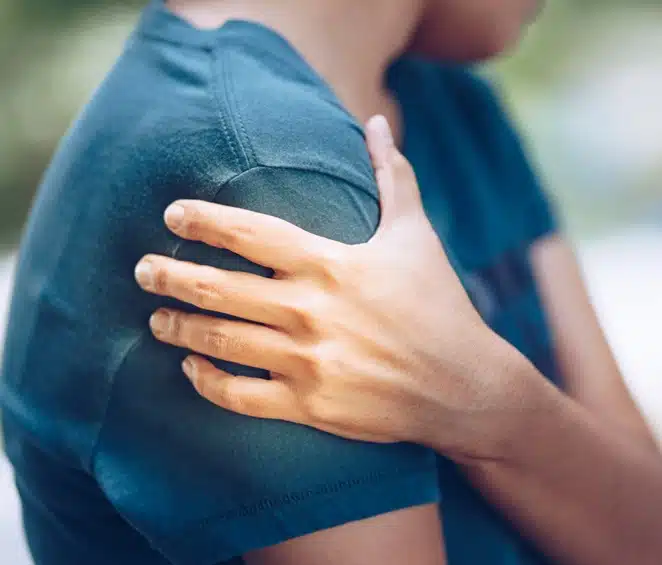This website uses cookies so that we can provide you with the best user experience possible. Cookie information is stored in your browser and performs functions such as recognising you when you return to our website and helping our team to understand which sections of the website you find most interesting and useful.

It’s essential for patients with shoulder arthritis to work closely with our Orthopedic team to ensure they follow a comprehensive treatment plan that meets their specific medical needs and goals.
This arthritic condition refers to inflammation and degeneration of the joints in the shoulder region. The two most common types of arthritis that affect the shoulders are osteoarthritis and rheumatoid arthritis:
Osteoarthritis: This is the most common form of arthritis, often referred to as “wear and tear” arthritis. It occurs when the protective cartilage cushions the ends of bones and wears down over time, leading to pain, stiffness, and reduced range of motion in the affected joint.
Rheumatoid arthritis: This is an autoimmune condition where the immune system mistakenly attacks the synovium, the lining of the membranes that surround the joints. This can cause inflammation, pain, and eventually damage to the cartilage and bone within the joint.
Other types of arthritis, such as psoriatic arthritis or septic arthritis, can also affect the shoulders, but they are less common.
If you are experiencing arthritis in your shoulders and need treatment, please contact Dr. Stephen W. Pournaras and our professional medical staff can help you recover by simply contacting us today.
What Is Arthritis?
The joints in your hands are constantly exposed to stressors due to everyday life, and in most cases your body repairs the damage naturally. With arthritis, this is not the case. The three forms of arthritis that affect the hands are:
Osteoarthritis effects the protective cartilage that covers the ends of the bones in your hands and effects the joints by gradually breaking it down and wearing it away. Cartilage is a very tough, shock-absorbing material that allows the bones in a joint to glide easily during motion and when gone, causes pain and injury.
The loss of the cartilage causes painful bone-on-bone rubbing. Other symptoms of arthritis include immobility, swelling, and the formation of bony growth spurs in the affected area.
Rheumatoid Arthritis (RA) is a chronic inflammatory disease, leading to hand deformity and loss of function. The protective membrane called synovium that covers joints, secrete a lubricant called synovial fluid, which acts as a cushion between the joints and ligaments to reduce friction between the bones and prevent “wear and tear.” RA causes the synovium to become inflamed, which prevents it from working properly.
Psoriatic arthritis causes pain, swelling and stiffness in and around the joints in your hands, It affects about 1 in 4 patients who already have the skin condition psoriasis. Some patients may develop psoriatic arthritis before the skin condition psoriasis is even present.
Psoriatic arthritis and psoriasis are both autoimmune conditions, caused by an issue in your immune system.
Your immune system protects you from illness and infection. But in autoimmune conditions, the immune system becomes confused and attacks healthy parts of the body, often causing inflammation.
Patients with psoriasis can get other types of arthritis, such as osteoarthritis or rheumatoid arthritis. These conditions are not linked to psoriasis though.
Symptoms of Shoulder Arthritis:
- Pain in the shoulder joint, particularly with movement or pressure
- Stiffness in the shoulder joint, especially in the morning or after periods of inactivity
- Decreased range of motion in the shoulder
- Swelling or tenderness around the shoulder joint
- Clicking or grinding sensations in the shoulder joint
Treatment for shoulder arthritis typically focuses on relieving pain, reducing inflammation, and improving shoulder function. This may include:
- Nonsteroidal anti-inflammatory drugs (NSAIDs) to reduce pain and inflammation.
- Physical therapy to improve strength, flexibility, and range of motion in the shoulder
- Corticosteroid injections to reduce inflammation and pain in the shoulder joint
- Lifestyle modifications, such as weight management and activity modification, to reduce stress on the shoulder joint
- In severe cases, surgery may be recommended, such as shoulder arthroplasty (shoulder joint replacement) or arthroscopic surgery to remove damaged tissue or bone spurs.
There are several surgical options based on the type and severity of your arthritis and your overall health. Dr. Stephen W. Pournaras Jr., will discuss options & help you decide which is best for you.
The most common surgical procedures are:
- Synovectomy- involving the removal of diseased or damaged lining of the joints
- Osteotomy- is the realignment of the bones in a joint
- Arthroplasty- joint replacement surgery, most common for advanced arthritis
Most surgeries are followed by physical therapy to strengthen the muscles and improve function. We also offer this therapy.
Surgery is recommended to our patients with severe symptoms such as pain, swelling, significant sleep interference, muscle weakness, the beginning of joint deformity. If you haven’t had any relief of your symptoms with at least 6-8 weeks of the non-surgical treatment options please contact us.
Make Your Appointment Today
Fair Oaks Orthopedics – Fairfax,VA


